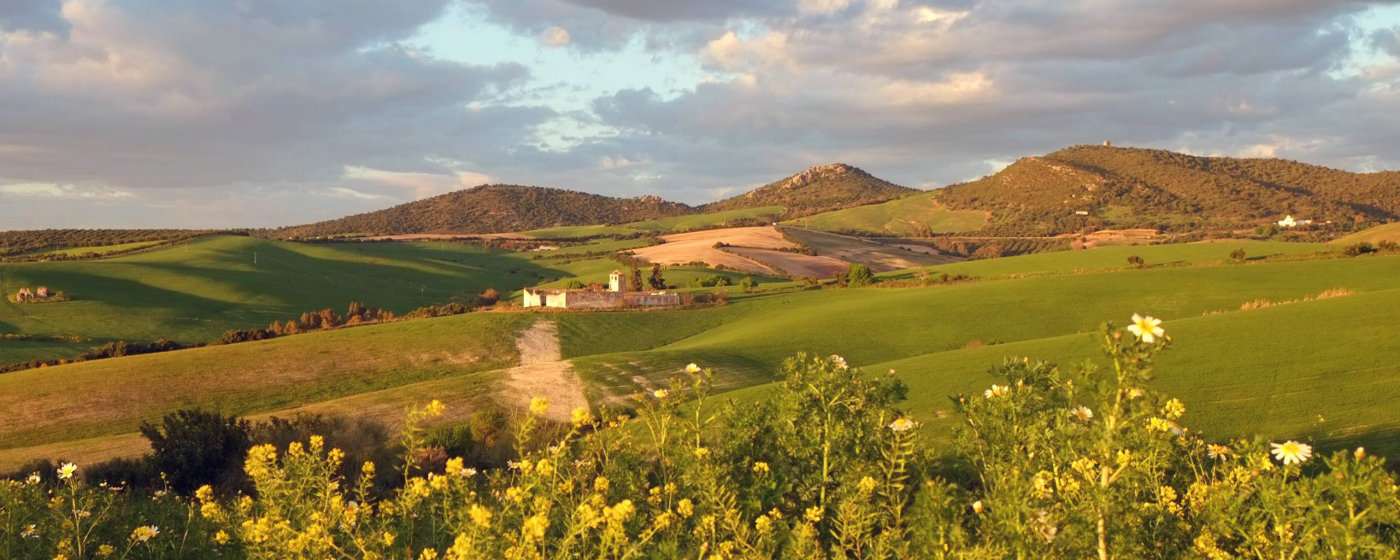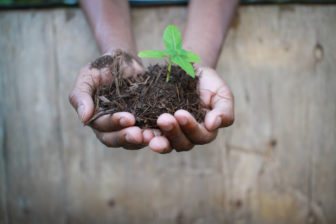21 Innovative Regeneration Projects
In November 2016, Regeneration International (RI) embarked on a journey in search of the world’s most inspiring, innovative projects working on regenerative agriculture, land use, or other solution-oriented concepts involving regeneration. To do this, we launched a micro-grants competition, Five Innovations for Regeneration, and the results were astounding. We received over 200 applications from 60 countries. It was difficult to do, but the “Five Innovations for Regeneration” micro-grants competition has selected five finalists and highlighted 16 honorable mentions.
Get inspired—Check out these 21 Innovative Regeneration Projects! Better yet—Sign up to RHub to engage with the projects!
5 Innovations for Regeneration (Finalists)
Acacias for All | Tunisia
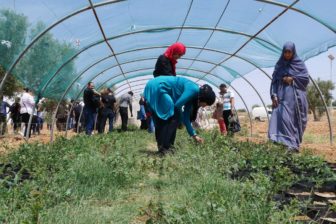 Acacias for All is halting desertification caused by climate change in Tunisia by planting green walls of acacia trees in collaboration with local rural populations. The project has 14 ambassadors in 13 regions of Tunisia and recently launched the “1 Million Trees for Tunisia” challenge.
Acacias for All is halting desertification caused by climate change in Tunisia by planting green walls of acacia trees in collaboration with local rural populations. The project has 14 ambassadors in 13 regions of Tunisia and recently launched the “1 Million Trees for Tunisia” challenge.
Agua Santa Regeneration | Ecuador
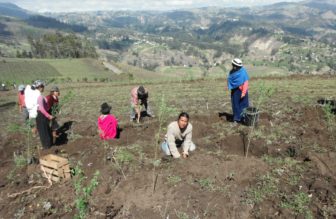 Agua Santa Regeneration regenerates the mountain ecosystems of their ancestral Andean lands through afforestation and reforestation with native species, and with the capture and propagation of beneficial microorganisms to improve soil fertility. They provide trainings for campesino families on the importance of reforestation, conservation of natural resources, and returning to indigenous agroecological farming methods. They support community livelihoods by providing fruit trees, medicinal plants and Andean grains for family gardens. For Agua Santa Regeneration, the regeneration of soils and water goes hand in hand with regeneration of culture and ancestral knowledge.
Agua Santa Regeneration regenerates the mountain ecosystems of their ancestral Andean lands through afforestation and reforestation with native species, and with the capture and propagation of beneficial microorganisms to improve soil fertility. They provide trainings for campesino families on the importance of reforestation, conservation of natural resources, and returning to indigenous agroecological farming methods. They support community livelihoods by providing fruit trees, medicinal plants and Andean grains for family gardens. For Agua Santa Regeneration, the regeneration of soils and water goes hand in hand with regeneration of culture and ancestral knowledge.
Grow a Farmer | Uganda
 Grow a Farmer combines information communication technology, permaculture and value added business into a single ‘three-dimensional model’ that is empowering a critical mass of small-scale farmers to regenerate ecosystems and build self-sustaining communities. Since 2008, they’ve worked with over 360 farmers groups and aim to train 150,000 farmers every year for the next 4 years. The farmers they work with grow coffee, fruit, corn and bananas. The project is supporting farmer to farmer learning, innovation and skill transfer, creating long-lasting impact and empowering small scale farmers to move their communities forward.
Grow a Farmer combines information communication technology, permaculture and value added business into a single ‘three-dimensional model’ that is empowering a critical mass of small-scale farmers to regenerate ecosystems and build self-sustaining communities. Since 2008, they’ve worked with over 360 farmers groups and aim to train 150,000 farmers every year for the next 4 years. The farmers they work with grow coffee, fruit, corn and bananas. The project is supporting farmer to farmer learning, innovation and skill transfer, creating long-lasting impact and empowering small scale farmers to move their communities forward.
SOIL | Haiti
SOIL is developing transformative social business models for the sustainable provision of urban household sanitation and waste treatment services in Haiti. SOIL’s EkoLakay social business collects and transports waste from locally made ecological toilets to a SOIL composting facility where the waste is safely treated and transformed into rich, organic compost using a process that respects World Health Organization standards. Revenues from toilet user fees and compost sales support ongoing project costs and showcase the potential to affordably and sustainably provide household sanitation in the world’s most vulnerable urban communities. Additionally, the compost produced restores soil fertility and supports reforestation.
TH Climate Park | Myanmar
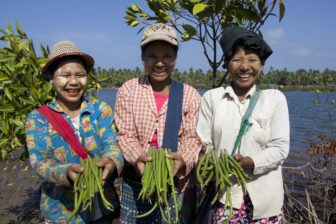 In partnership with Dr. Arne Fjortoft, Secretary General of Worldview International Foundation Dr. Bremley Lyngdoh, Founder & CEO of Worldview Impact Foundation has been working to restore and regenerate the degraded mangrove ecosystems at the 750 ha Thor Heyerdahl Climate Park in the Delta Region of Myanmar to protect the lives of highly vulnerable communities. The park was created in honor of the well-known Norwegian author, scientist, environmentalist and explorer Thor Heyerdahl. Since 2012 when the project started 2.7 million mangrove trees have been planted Dr. Lyngdoh is now working with BioCarbon Engineering with a mission to plant 1 billion trees in 250,000 ha by deploying tree-planting drones and securing the resilience of the project through the creation of a blockchain structured Ecosystem Services marketplace powered by Route2.
In partnership with Dr. Arne Fjortoft, Secretary General of Worldview International Foundation Dr. Bremley Lyngdoh, Founder & CEO of Worldview Impact Foundation has been working to restore and regenerate the degraded mangrove ecosystems at the 750 ha Thor Heyerdahl Climate Park in the Delta Region of Myanmar to protect the lives of highly vulnerable communities. The park was created in honor of the well-known Norwegian author, scientist, environmentalist and explorer Thor Heyerdahl. Since 2012 when the project started 2.7 million mangrove trees have been planted Dr. Lyngdoh is now working with BioCarbon Engineering with a mission to plant 1 billion trees in 250,000 ha by deploying tree-planting drones and securing the resilience of the project through the creation of a blockchain structured Ecosystem Services marketplace powered by Route2.
16 Honorable Mentions
Allin Mikuy Ayllu | Peru
Allin Mikuy Ayllu is the only food consumer collective in Lima, Peru. They promote sustainable and regenerative livelihoods based on principles of food sovereignty and the solidarity economy through organizing a fair trade monthly food box scheme connecting agroecological farmers with consumers. Their goal is to strengthen relations between urban consumers and agroecological farmers for responsible consumption and sustainability. Since 2012 they have produced 35 boxes, which included 60-120 sustainable products, involving dozens of producers and hundreds of consumers. They are a part of The Urban Agriculture Platform of Lima (PAUL) and the Council of Sustainable Settlements of Latin America (CASA).
American Chestnut Land Trust: Double Oak Farms | USA
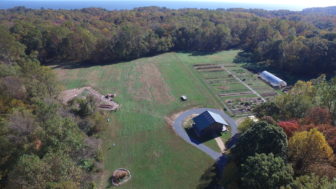 The American Chestnut Land Trust is a non-profit organization working towards a sustainable future through stewardship of the environment. A major component of the trust is Double Oak Farms. This agriculture supporting the community (ASC) operation enhances and educates the community in innovative and holistic agricultural techniques while donating 80 percent of all produce to a local food pantry. Each year the project has donated roughly 4000 lbs of produce, while the remainder goes to dedicated volunteers who log over 2000 hours each year. On approxmately 3000 acres of pristine preserved property, this operation models low impact production for the community to replicate.
The American Chestnut Land Trust is a non-profit organization working towards a sustainable future through stewardship of the environment. A major component of the trust is Double Oak Farms. This agriculture supporting the community (ASC) operation enhances and educates the community in innovative and holistic agricultural techniques while donating 80 percent of all produce to a local food pantry. Each year the project has donated roughly 4000 lbs of produce, while the remainder goes to dedicated volunteers who log over 2000 hours each year. On approxmately 3000 acres of pristine preserved property, this operation models low impact production for the community to replicate.
CarbonToSoil | Finland
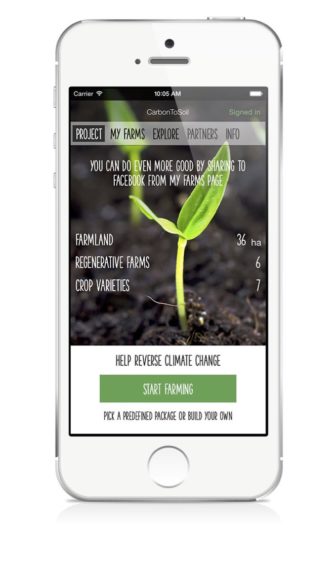 Climate change is a real threat. The total amount of carbon on Earth is constant but currently in the wrong from: as carbon dioxide in the atmosphere. CarbonToSoil is a nonprofit project that enables anyone to help reverse climate change by adjusting current agricultural methods in order to draw carbon back into the soil. The solution: In-app purchases enable anyone to support real farms to change their agricultural methods to regenerative farming. The app also allows users to personally support food production and see how food is grown. The proceeds raised through the app are used to regenerate more land, research, education and scaling the project globally. Why just reduce climate change when we can reverse it?
Climate change is a real threat. The total amount of carbon on Earth is constant but currently in the wrong from: as carbon dioxide in the atmosphere. CarbonToSoil is a nonprofit project that enables anyone to help reverse climate change by adjusting current agricultural methods in order to draw carbon back into the soil. The solution: In-app purchases enable anyone to support real farms to change their agricultural methods to regenerative farming. The app also allows users to personally support food production and see how food is grown. The proceeds raised through the app are used to regenerate more land, research, education and scaling the project globally. Why just reduce climate change when we can reverse it?
Danyadara Permaculture | Spain
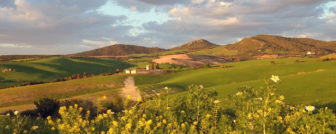 “Danyadara” is a simplification of two sanskrit words, “dhanya” and “dhara,” which together mean Blessed Earth. Danyadara is a not-for-profit permaculture project focused on land regeneration. They are reversing desertification in Andalucia, Spain through sustainable agriculture techniques, creating a legacy that will inspire the region for years to come. To date, over 1,000 trees have been planted on 24 Hectares, including 700 Centenary Oliver trees for production. They also host two to four permaculture courses per year.
“Danyadara” is a simplification of two sanskrit words, “dhanya” and “dhara,” which together mean Blessed Earth. Danyadara is a not-for-profit permaculture project focused on land regeneration. They are reversing desertification in Andalucia, Spain through sustainable agriculture techniques, creating a legacy that will inspire the region for years to come. To date, over 1,000 trees have been planted on 24 Hectares, including 700 Centenary Oliver trees for production. They also host two to four permaculture courses per year.
Durga’s Den | Jamaica
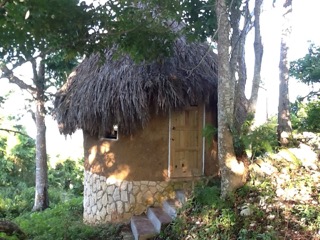 Durga’s Den is a project on the North Coast of Jamaica where self-reliance and regenerative agriculture techniques are demonstrated. In partnership with the hotel industry, they are getting organic input used to feed systems such as vermicomposting, composting and animal feeding. The demo farm trains the community members wanting to participate in the regenerative practices through workshops and work exchanges. There is also a strong reforestation component through the use of agroforestry techniques.
Durga’s Den is a project on the North Coast of Jamaica where self-reliance and regenerative agriculture techniques are demonstrated. In partnership with the hotel industry, they are getting organic input used to feed systems such as vermicomposting, composting and animal feeding. The demo farm trains the community members wanting to participate in the regenerative practices through workshops and work exchanges. There is also a strong reforestation component through the use of agroforestry techniques.
Fresh Organic Farming | Uganda
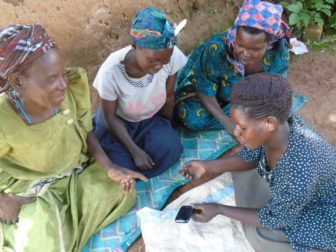 YICEUganda is a startup social enterprise that provides rural smallholder farmers in Uganda with flexible farm loans, inputs and training services to reduce hunger and poverty. With a network of loc al farm agents, YICEUganda facilitates farmers’ access to bundled agricultural services at various levels of the farming value chain, including seed sourcing and access to farm loans. Since 2016, YICEUganda has implemented the Fresh Organic Farming Project that seeks to nurture a network of 5,000 environmentally conscious farmers to protect and conserve the environment by 2020. This comes from their desire to achieve sustainable farming for all rural smallholder farmers, ensure increased incomes and food security. The project offers three key organic services that include: organic farming trainings, production of organic fertilizers, and establishment of organic demonstration gardens.
YICEUganda is a startup social enterprise that provides rural smallholder farmers in Uganda with flexible farm loans, inputs and training services to reduce hunger and poverty. With a network of loc al farm agents, YICEUganda facilitates farmers’ access to bundled agricultural services at various levels of the farming value chain, including seed sourcing and access to farm loans. Since 2016, YICEUganda has implemented the Fresh Organic Farming Project that seeks to nurture a network of 5,000 environmentally conscious farmers to protect and conserve the environment by 2020. This comes from their desire to achieve sustainable farming for all rural smallholder farmers, ensure increased incomes and food security. The project offers three key organic services that include: organic farming trainings, production of organic fertilizers, and establishment of organic demonstration gardens.
Gaia Education | United Kingdom
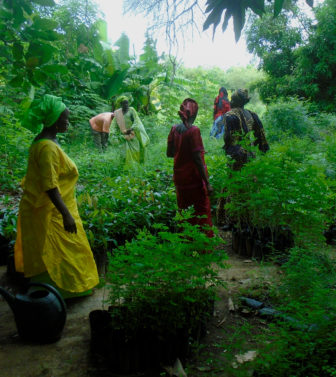 Gaia Education envisions a world where communities have harmonised their social, economic and natural systems, so that they thrive within bioregional and planetary boundaries, regenerating their environment and allowing diverse human potential and all life to flourish. Gaia Education contributes to this vision by providing leading-edge online and face-to-face ‘Design for Sustainability’ programmes using their Whole Systems Design Framework. Their long-term Project Based Learning Programmes assist fragile communities to replace petrochemical agriculture with regenerative food systems, focused on well-being and resilience. They help over-consuming communities reduce their ecological and carbon footprints, whilst strengthening their regional economy and revitalizing their community.
Gaia Education envisions a world where communities have harmonised their social, economic and natural systems, so that they thrive within bioregional and planetary boundaries, regenerating their environment and allowing diverse human potential and all life to flourish. Gaia Education contributes to this vision by providing leading-edge online and face-to-face ‘Design for Sustainability’ programmes using their Whole Systems Design Framework. Their long-term Project Based Learning Programmes assist fragile communities to replace petrochemical agriculture with regenerative food systems, focused on well-being and resilience. They help over-consuming communities reduce their ecological and carbon footprints, whilst strengthening their regional economy and revitalizing their community.
Greening the Desert | Mexico
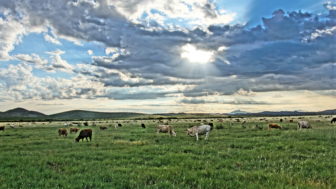 Pasticultores del Desierto follows nature’s way to keep their desert grasslands beautiful and healthy while making a living off the land. Nature’s way is to use a diversity of living organisms such bison and pronghorn as a herd and move on, leaving a trace of fertility while allowing land to rest. As ranchers, the team mimics the migratory patterns of large wild herbivores using cattle, water points and fence. This enables them to restore bare, unproductive land into productive, native grasslands. To date, they’ve done it on more than 200,000 hectares in the Chihuahuan desert, in northern Mexico, and are working to get up to one million hectares by 2030.
Pasticultores del Desierto follows nature’s way to keep their desert grasslands beautiful and healthy while making a living off the land. Nature’s way is to use a diversity of living organisms such bison and pronghorn as a herd and move on, leaving a trace of fertility while allowing land to rest. As ranchers, the team mimics the migratory patterns of large wild herbivores using cattle, water points and fence. This enables them to restore bare, unproductive land into productive, native grasslands. To date, they’ve done it on more than 200,000 hectares in the Chihuahuan desert, in northern Mexico, and are working to get up to one million hectares by 2030.
Irish Biochar Coop | Ireland
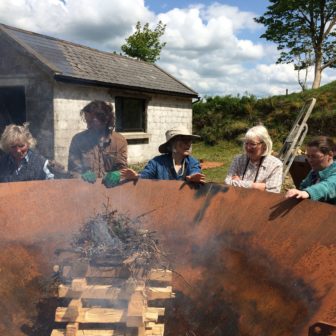 The Biochar Coop sells a kiln that burns cleanly to make a certified agricultural charcoal from waste biomass. Their SilageChar and FeedChar can increase yields, improve animal health and regenerate soils and are aimed at organic dairy and beef farmers. They also transform invasive species and scrub into a soil amendment and pollution adsorber to protect waterbodies.
The Biochar Coop sells a kiln that burns cleanly to make a certified agricultural charcoal from waste biomass. Their SilageChar and FeedChar can increase yields, improve animal health and regenerate soils and are aimed at organic dairy and beef farmers. They also transform invasive species and scrub into a soil amendment and pollution adsorber to protect waterbodies.
Their products can help meet Irish agriculture targets to increase dairy by 50 percent without increasing GHG if used by 50 percent of Irish dairy and beef farmers in their slurry tanks and silage. And that’s just counting the GHG offsets of the carbon in the biochar. Research shows that biochar has an even greater GHG reduction effects in tank, rumen and soil over the whole milk production cycle.
Olio | United Kingdom
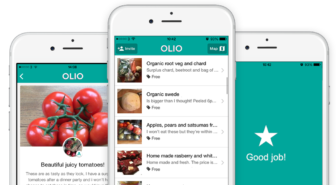 OLIO is a free app tackling the problem of food waste by connecting people with their neighbours and with local shops & cafes so that surplus food can be shared, not thrown away. Users snap a picture of their items and add them to OLIO; neighbours receive customised alerts and can request anything that takes their fancy. Pick-up takes place, often the same day, at the home, store, or another agreed location. Launched in January 2016 OLIO has over 185,000 users who have together shared 225,000 items of food—equivalent to almost 100,000 meals.
OLIO is a free app tackling the problem of food waste by connecting people with their neighbours and with local shops & cafes so that surplus food can be shared, not thrown away. Users snap a picture of their items and add them to OLIO; neighbours receive customised alerts and can request anything that takes their fancy. Pick-up takes place, often the same day, at the home, store, or another agreed location. Launched in January 2016 OLIO has over 185,000 users who have together shared 225,000 items of food—equivalent to almost 100,000 meals.
Paradise Farm | Sri Lanka
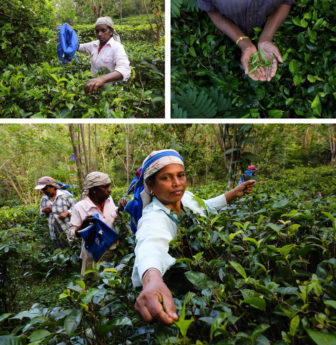 Paradise Farm was created when Dr. Arne Fjortoft, Secretary General of Worldview International Foundation pioneered organic agriculture in 1996 by taking over a neglected farm and turning it into a demonstration project. The farm now holds more than 800 different plants species as part of its biodiversity strategy with value added production of organic green tea, organic virgin coconut oil, fruits and spices, all classified as highly beneficial to health. Dr. Bremley Lyngdoh, Founder & CEO of Worldview Impact Foundation later created the Green Goodness project to train students at Richmond Park Academy in the UK to rebrand and sell the organic green tea that was sourced directly from the women of Paradise Farm in Sri Lanka and promote Equal Trade.
Paradise Farm was created when Dr. Arne Fjortoft, Secretary General of Worldview International Foundation pioneered organic agriculture in 1996 by taking over a neglected farm and turning it into a demonstration project. The farm now holds more than 800 different plants species as part of its biodiversity strategy with value added production of organic green tea, organic virgin coconut oil, fruits and spices, all classified as highly beneficial to health. Dr. Bremley Lyngdoh, Founder & CEO of Worldview Impact Foundation later created the Green Goodness project to train students at Richmond Park Academy in the UK to rebrand and sell the organic green tea that was sourced directly from the women of Paradise Farm in Sri Lanka and promote Equal Trade.
Shanao Cacoa Collective | Peru
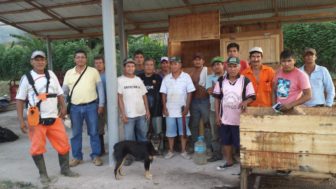 Shanao Cacoa Collective aims to create sustainable jobs in agroecology, which integrate community based-conservation and public health systems throughout the Alto Mayo Valley of Peru. To achieve this mission, Shanao Cacao works hand in hand with farmers to implement a regenerative village hub for growing and processing organic, native superfoods, including sacha inchi, and cacao.
Shanao Cacoa Collective aims to create sustainable jobs in agroecology, which integrate community based-conservation and public health systems throughout the Alto Mayo Valley of Peru. To achieve this mission, Shanao Cacao works hand in hand with farmers to implement a regenerative village hub for growing and processing organic, native superfoods, including sacha inchi, and cacao.
The Soft Foot Alliance | Zimbabwe
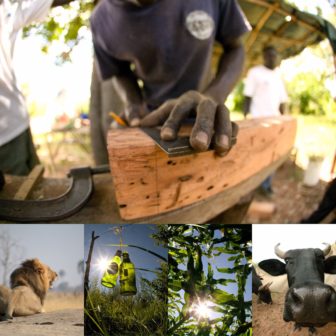 The Soft Foot Alliance is dedicated to improving the lives and landscapes of the people living on the boundary of Zimbabwe’s Hwange National Park. They are a husband and wife team and along with their son they try to “walk the talk,” living in a self built natural homestead, finding simple solutions for people and wildlife to coexist. They regenerate degraded landscapes by offering sustainable alternatives to environmentally harmful practices through permaculture, holistic management and sweat.
The Soft Foot Alliance is dedicated to improving the lives and landscapes of the people living on the boundary of Zimbabwe’s Hwange National Park. They are a husband and wife team and along with their son they try to “walk the talk,” living in a self built natural homestead, finding simple solutions for people and wildlife to coexist. They regenerate degraded landscapes by offering sustainable alternatives to environmentally harmful practices through permaculture, holistic management and sweat.
Soil Carbon Coalition | USA
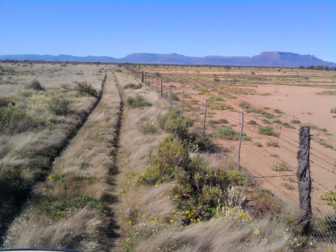 Soil Carbon Coalition’s learning materials about soil-health and watershed-function and their open-source monitoring/mapping platform are aimed at creating a generation of farmers, policy makers, scientists & citizens who can: think in systems; see and track how soil health is impacting public health, flooding, drought, erosion, climate, biodiversity, & food and water security; understand the power of photosynthesis, soil biology & land management to improve local & global conditions; and engage that power as they create healthy communities around them. Soil Carbon Coalition is collaborating with the USDA-Climate Hubs, 4-H, the Future Farmers of America (FFA), schools, and other community and farming groups.
Soil Carbon Coalition’s learning materials about soil-health and watershed-function and their open-source monitoring/mapping platform are aimed at creating a generation of farmers, policy makers, scientists & citizens who can: think in systems; see and track how soil health is impacting public health, flooding, drought, erosion, climate, biodiversity, & food and water security; understand the power of photosynthesis, soil biology & land management to improve local & global conditions; and engage that power as they create healthy communities around them. Soil Carbon Coalition is collaborating with the USDA-Climate Hubs, 4-H, the Future Farmers of America (FFA), schools, and other community and farming groups.
RegenSoil Project | United Kingdom
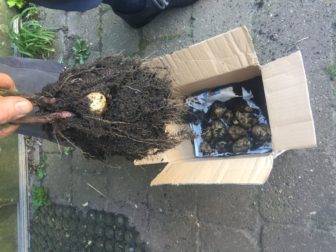 Since 2015, the International Year of Soil, Glyn Mitchell of the Credible Food Project has been working with farmers to build soil microbe levels to reduce the amount of chemical fertilizers used to poison and strip carbon from soils in the Jersey Channel Islands (famous for the Jersey Cow). With more and more carbon smart biotic farmers realizing the advantages of farming soil microbes first, crops second, soil becomes healthier, plants benefit from a better balanced microbial biomass surrounding their crops rhizosphere so carbon trading for minerals and nutrients between plants and microbes can take place. As long as regenerative practices continue, farmers soon discover it is easier and cheaper to work with the microbes than against them. Earlier this year, RegenSoil Project had already trained 20 people in 2 months, and so far no one has returned to using chemicals.
Since 2015, the International Year of Soil, Glyn Mitchell of the Credible Food Project has been working with farmers to build soil microbe levels to reduce the amount of chemical fertilizers used to poison and strip carbon from soils in the Jersey Channel Islands (famous for the Jersey Cow). With more and more carbon smart biotic farmers realizing the advantages of farming soil microbes first, crops second, soil becomes healthier, plants benefit from a better balanced microbial biomass surrounding their crops rhizosphere so carbon trading for minerals and nutrients between plants and microbes can take place. As long as regenerative practices continue, farmers soon discover it is easier and cheaper to work with the microbes than against them. Earlier this year, RegenSoil Project had already trained 20 people in 2 months, and so far no one has returned to using chemicals.
Witnessing Trees | Philippines
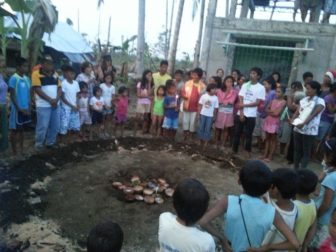 Witnessing Trees by Green Releaf tells the story of how grassroots and community leadership are developing resilience in climate and conflict vulnerable areas through regenerative solutions for food security, livelihood and ecosystem restoration in the Philippines. Their hope is to reclaim spaces as sacred for collective healing through ecovillage and permaculture solutions. It was inspired by a tree at the COP21 in Paris where the landmark climate agreement to end the fossil fuel era was drafted. Trees symbolize hope in terms of carbon capture and as source of food, shelter, safety and even refuge during and after disasters.
Witnessing Trees by Green Releaf tells the story of how grassroots and community leadership are developing resilience in climate and conflict vulnerable areas through regenerative solutions for food security, livelihood and ecosystem restoration in the Philippines. Their hope is to reclaim spaces as sacred for collective healing through ecovillage and permaculture solutions. It was inspired by a tree at the COP21 in Paris where the landmark climate agreement to end the fossil fuel era was drafted. Trees symbolize hope in terms of carbon capture and as source of food, shelter, safety and even refuge during and after disasters.

